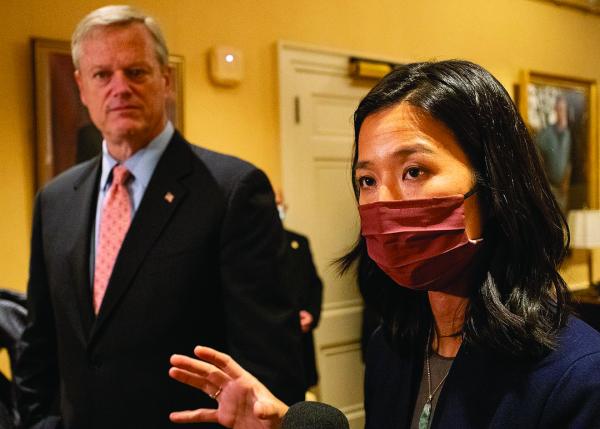December 1, 2021

Gov. Charlie Baker and Mayor Michelle Wu spoke to reporters after a meeting in his office on Nov. 17. (Sam Doran/State House News Service photo)
Marty Walsh and Charlie Baker had what wags called a “bromance,” a close relationship that started when the Boston mayor and the Massachusetts governor stayed in constant contact during the battery of winter storms in 2015.
With Walsh’s elected successor, Mayor Michelle Wu, Baker appears to be hoping for more of a non-aggression pact. That’s apparent from Baker’s comments to reporters when he isn’t pushing off questions about whether or not he’s running for a third four-year term next year.
Appearing this week on GBH’s “Boston Public Radio,” Baker relayed to the hosts tidbits from his conversation with Wu the day after she was sworn in. She had brought up the fare-free bus pilot that’s underway through the end of the year on Route 28, and her desire to add two additional routes (the 23 and 29) as part of a longer, two-year pilot funded through federal dollars. “I said, ‘Sure. We’ll work with you to figure that out,’” Baker said.
Fare-free public transit was one key plank of Wu’s campaign platform. The other was rent control, which Baker opposes, citing an experience from when he was younger, and he was paying market rate while a rent-controlled apartment nearby housed an older couple who earned more money than he did. “She said that wasn’t the way she was thinking about it,” Baker told his interviewers, “so we’ll see where that goes.”
Baker has good reason to crack open doors in efforts to forge a working relationship with Boston’s mayor: The city’s chief executives can make life difficult for Massachusetts governors, if history is a guide.
In the book he released before he died in 2014, Mayor Thomas Menino wrote about how he clashed with Gov. William Weld in the 1990s. Weld and New England Patriots owner Robert Kraft wanted a stadium in South Boston, while Menino wanted a convention center. Weld ended up poking Menino one too many times about the Patriots pulling up stakes and leaving the Bay State; in a phone call that Menino characterized as “not fit for the ears of the nuns at St. Thomas Aquinas,” he let the patrician have it.
The stadium idea later died only to be resurrected well down the road in Foxborough, while Menino got his South Boston convention center after a bond bill, larded with line items that drew support from lawmakers across Massachusetts, passed by a veto-proof margin.
Wu already has a good relationship with a number of state legislators. Lawmakers inside and outside Boston made up a good chunk of her endorsements as she barreled towards Election Day on Nov. 2. They included House Ways and Means Chairman Aaron Michlewitz of the North End and Assistant Majority Leader Michael Moran of Brighton.
Days after Wu’s meeting with Baker in his State House office, members of Boston’s State House delegation walked to the Parkman House, the city-owned mansion next door, for a morning huddle with the new mayor. Coffee, crab Rangoon, and scallion pancakes were part of the spread.
“I think she sent the right message, the right tone,” Rep. Russell Holmes, a Mattapan Democrat, said afterwards. “She wants to be a true partner. Not a person who wants to just kind of come in and say, ‘Here are the things I want, the things I want to do at the state level.’”
For lawmakers, collaboration and dialogues were the key words. “So often what we’ve seen, there’s no input and there’s something that’s announced. And when that happens at the State House, it’s just announced, it lands pretty flatly,” Holmes said. “So I think after seeing that for years and years and years, it would be good for her to do it a different way.”
After receiving 91,000 votes on Election Day, more than Menino and Walsh picked up, in 2009 and 2013, respectively, Wu is already starting, as Baker put it after their hour-long meeting on her first full day as mayor, with “the wind at her back.”
When they walked out to greet reporters waiting in the governor’s lobby, Wu was wearing a mask and Baker did most of the talking.
At one point, Baker volunteered that he’d garnered 108,000 votes in Boston when he ran for reelection in 2018, falling just several thousand short of winning the Democratic city. “I’m willing to bet that a bunch of the folks who voted for me also voted for her,” he added. “And I think it’s important for us to recognize and understand, as I said, that we do have a lot of shared interests in the success of the city and the success of the state. And I’m going to work really hard to make our focus on that.”
A reporter jumped in, asking Wu what that may say about her win, that they may have shared some supporters. “I mean, you’d have to ask – we’d have to identify the supporters and ask them,” she said.
Another reporter asked Baker about his “bromance” with Walsh and how his relationship with Wu might be different. Baker said, “Look, times change and context changes.” City Hall and the State House are “locked in a partnership,” one way or another, he added.
“Whether or not we’ll get to the point where my wife will be taking my phone away from me on a Saturday night at 10 o’clock and telling Marty Walsh that it’s time for the boys to stop talking, who knows,” Baker said.
Topics:


